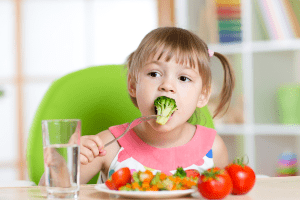To support the rapid growth and development children experience in early childhood, healthy eating is vital. Not only can good nutrition promote appropriate growth and development for children during their early years, it can also impact their behaviour and wellbeing. Education, support and access to healthy foods works alongside physical activity to ensure children get the best start in life.
Research indicates that only 5% of Australian children are meeting the recommended guidelines of five serves of vegetables daily. From 15 to 21 October, it is Nutrition Week, aiming to raise awareness of the connection between healthy eating and good health. What better opportunity to take a fresh look at how early childhood education can support the formation of healthy eating and their impact on children’s wellbeing.
The National Quality Standard requires early childhood education services to actively promote healthy eating. This includes services who do not provide food or beverages — all providers must be making, serving, encouraging and/or celebrating food that is nutritious to help young children begin to establish patterns of healthy eating.
There are many ways services can support children to have a firm understanding of nutrition, such as:
- A focus on fresh, unprocessed foods
- The facilitation of positive mealtimes
- Creating a connection between the educational program and meals
- And more
Fostering a positive relationship with healthy food now will pave the way for a thriving future for children.

A healthy focus on nutrition in early childhood
Healthy eating habits can provide benefits for children’s health and wellbeing throughout their entire lives. By fostering an understanding and appreciation of eating healthily in childhood, educators can help to lay the foundation for children to nourish themselves right through into adulthood.
Throughout a child’s early childhood years, getting the right amount of nutrients is of particular concern as they are growing and developing quickly. Adequate macronutrients are needed, such as fats and protein, along with micronutrients including iron, zinc, vitamin A and iodine. This is to ensure children have the best chance to thrive through their childhood, optimise their wellness and avoid delays in their development, both mentally and physically.
Area 2 of the National Quality Framework, which provides for children’s health and safety, is focused on children’s nutrition. Early childhood services are required to ensure their food offerings are adequate in quantity, nutritious and are appropriate for each child’s developmental needs and cultural, health or religious requirements.
Optimise development and wellbeing with healthy eating
For many people, the thought of nutrition and health makes them think of maintaining healthy weight. And while this is a positive outcome of healthy eating habits combined with physical movement, the advantages go much further than that.
Good nutrition in early childhood offers a range of benefits, including:
- Optimal brain development
- Improved ability to learn
- Protection against illness
- Appropriate physical growth
- Better quality of life
Empowering children to make these healthy food choices for themselves means that they will continue to enjoy the benefits of good nutrition as they gain independence and grow into healthy adults.
Support healthy eating for children
Good habits start young, so the earlier we begin to guide children to a life of healthy eating, the better. Education, support and consistency can enable children of any age to transition to enjoying mealtimes with a plate full of delicious, nutritious food.
There are a few strategies that can make healthy eating simple and satisfying for all involved. Here are a number of tips to try that will encourage a love of good foods:
Grow your own in early learning settings
Planting, watering and caring for plants is always an area of fun and fascination for children. Growing things that children are allowed to eat takes it to a whole new level!
Many herbs, fruits and vegetables are inexpensive and easy to plant and grow, plus they provide an invaluable educational experience in early childhood that will help children to get excited about eating healthy food. Create a compost for scraps too!
Cooking in centres
Children love to be a part of the journey and are significantly more likely to eat a meal or snack that they have been involved in making.
Tie this in with the previous tip of growing food and you could find that children are so excited about this process they will want to eat everything from the garden.
Offering simple guidelines
Eating well doesn’t need to be over-complicated. Create some simple rules or guidelines to follow (most of the time — treats are good too!). Suggestions could be to ensure half your plate is fruit or vegetables.
Trying to ‘eat the rainbow’ so each child is inclined to choose different coloured fruit and vegetables. Avoiding wrappers and packaging is a good rule to minimise the consumption of processed foods while caring for the planet too.
Make mealtimes enjoyable
A sense of inclusion during mealtimes can help children feel inclined to eat healthily with others. Ensure the eating environment in your service makes everyone comfortable and gives them the required support to enjoy the mealtime.
A calm transition to mealtime is ideal, and encouraging educators to role model by eating a healthy snack with children can go a long way to promote healthy habits too.
Make smart swaps
A clever switch from white bread to wholegrain bread can make a sandwich much healthier. Try switching to wholegrain pasta too. Swap sugar on cereal for fruit pieces. Ditch juice for water, or water with a squeeze of fresh fruit. Make smoothies instead of milkshakes.
These are delicious options with much higher nutritional value.
Have fun with food
If you want to make healthy eating extra fun and enticing, make it look exciting. Fruit cut into different shapes or on kebab sticks is popular with children. Making a face on the plate using a variety of foods is often enjoyable.
Sustainable choices for health and earth
Healthy eating can be healthy for the planet as well as people. With the right choices, we can simultaneously sustain health and sustain the Earth. Opting to eat seasonal fresh fruit and vegetables is one way of promoting sustainable healthy eating, along with eating less packaged, processed foods to reduce waste and getting creative with making meals that use leftovers.
Use Nutrition Week as a reminder to prioritise healthy food and positive mealtimes in your service. Support children’s development, wellbeing and early childhood education further by fostering healthy eating in your centre. What children learn now will lay a solid foundation for a future of nutritious food choices and optimal health in life.
Get in touch with us to learn more about how we can help you centre and its educators reach their full potential.


